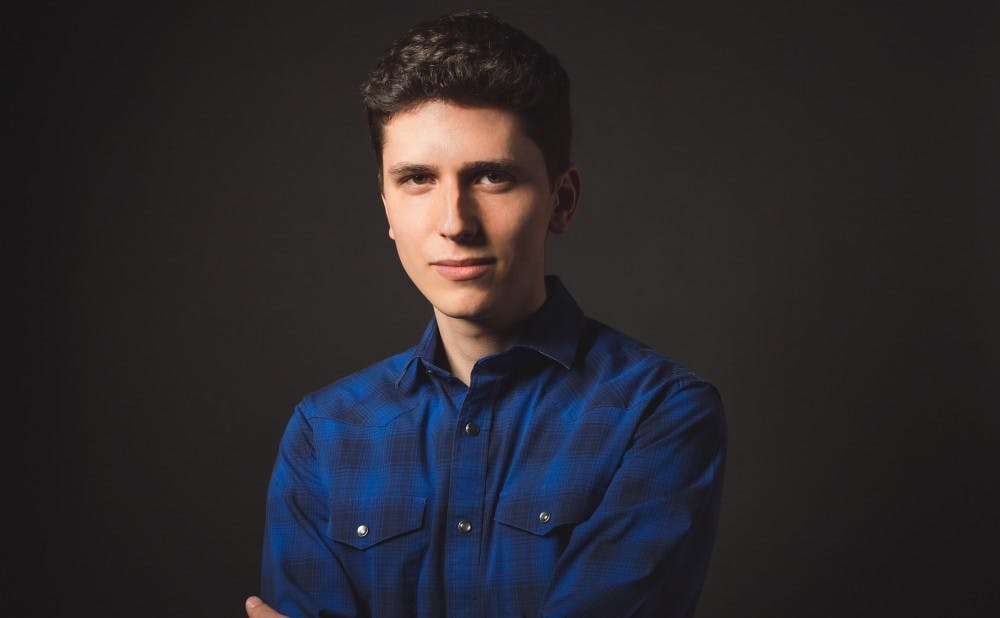In the course he teaches, “Introduction to Performing Arts Management & Entrepreneurship,” Eric Oberstein, Trinity ‘07, mentors Duke students in putting together the resources for a creative project, creating an ideal environment for artists and connecting with a network of alumni in the arts.
He has applied many of the same principles to his work as a music producer. On Sept. 20, Dafnis Prieto Big Band’s “Back to the Sunset,” which Oberstein produced, was nominated for Best Latin Jazz Album at the Latin Grammys. The award ceremony, whose winners are selected by the Latin Record Academy — a different voting body than the one that selects the Grammys broadcasted in February — takes place Nov. 15 in Las Vegas.
With this latest honor, Oberstein’s productions have garnered eight nominations and four wins between the Grammy and Latin Grammy Awards. The result of a nearly three-year process of funding, recording and producing, “Back to the Sunset” marks another milestone for Oberstein’s career as a producer and represents a unique effort between Duke alumni.
Oberstein, who is also the associate director of Duke Performances, said he met John Hahn, Trinity '74, after an album he produced for Arturo O’Farrill & The Afro-Latin Jazz Orchestra, “The Offense of the Drum,” won the Grammy Award for Best Latin Jazz Album. Not long after, he began the early stages of planning the project with drummer Dafnis Prieto in 2016. Later that year, Oberstein connected with Harsha Murthy, Trinity ‘81, who eventually met with Prieto when the drummer performed at a gala in New York for the American Friends of the Ludwig Foundation of Cuba in November 2016.
“It was like watching a tennis match,” Murthy said of seeing Prieto behind the drums. “All the other musicians in [the] band just seemed to play better. The level of their game rose.”
Hahn would serve as associate producer of the album while Murthy would serve as executive producer, helping to secure funds for its production. After selecting a roster of musicians with big band experience and playing the world premiere of the new band at New York’s Jazz Standard, Oberstein and Prieto entered the studio to record the album in August 2017.
Much of the challenge in making “Back to the Sunset” was due to the great financial and personnel-related considerations required to produce any big band record. It’s safe to say that big band music is not what sells in 2018, and for this reason, shopping the project to a music industry reluctant to take risks was a difficult prospect. But for Prieto — who fell in love with big band music as a child in Cuba — packing 16 to 18 musicians into a studio was central to his vision for the project. It was clear, Oberstein said, “that this was something we’d have to make ourselves.”
“[Big band music] is a very expensive kind of artistic production to mount because you’ve got so many musicians and all,” Murthy said. “It was kind of a sense that this is the sound they wanted to produce, and something magical would come out of it.”
Once in the studio, Oberstein’s job as producer was to ensure the musicians had a creative environment that would bring out their best work, from organizing daily recording schedules and track sequencing to making sure everyone got fed. And from a creative standpoint, he acted as something of a right-hand man to Prieto — who was behind the drum set — giving an opinion on each take from behind the board. After months spent in its final mixing, mastering and design stages, “Back to the Sunset” was released in April. Since then, Prieto’s band has played a number of shows in support of the album, including a Duke Performances concert set for March 29, 2019, in Baldwin Auditorium.
Although “Back to the Sunset” was effectively an independent effort — it was released on Prieto’s own Dafnison Music label — both Oberstein and Murthy emphasized the importance of their network of alumni in making the project possible. Murthy, whose contributions to arts at Duke include rooms in Bostock Library and the Rubenstein Arts Center, compared the artistic process to an investment in any field.
“Producing an art project is a lot like producing, starting up a start-up company. You look at the people and the talent and you say what’s the project,” Murthy said. “I trusted my gut that, between Eric and Dafnis, I had the real thing.”
Oberstein, who has been in close proximity with the development arts on campus in his course and in his role at Duke Performances, noted that the increased role of arts on campus may mean Duke will see more projects like his.
“As the arts at Duke have become more visible and more and more alums are working in the arts or arts management or arts business, you’re going to see more and more of those collaborations,” Oberstein said. “It’s one of the nice byproducts of being a part of this community. And it doesn't happen everywhere.”
In other words, it doesn’t appear that Oberstein will be Duke’s last Grammy nominee.
Get The Chronicle straight to your inbox
Signup for our weekly newsletter. Cancel at any time.

